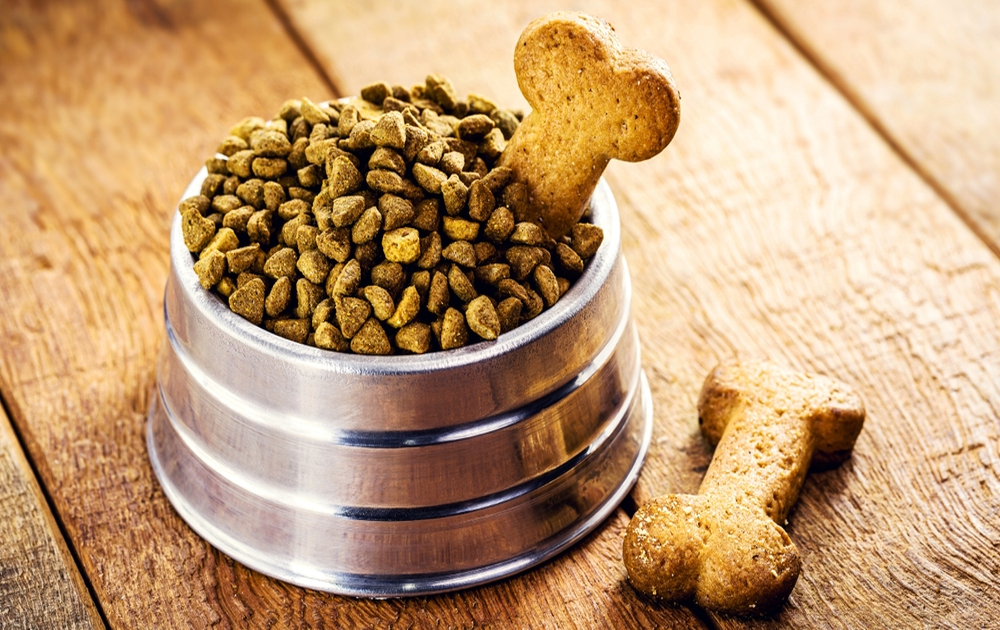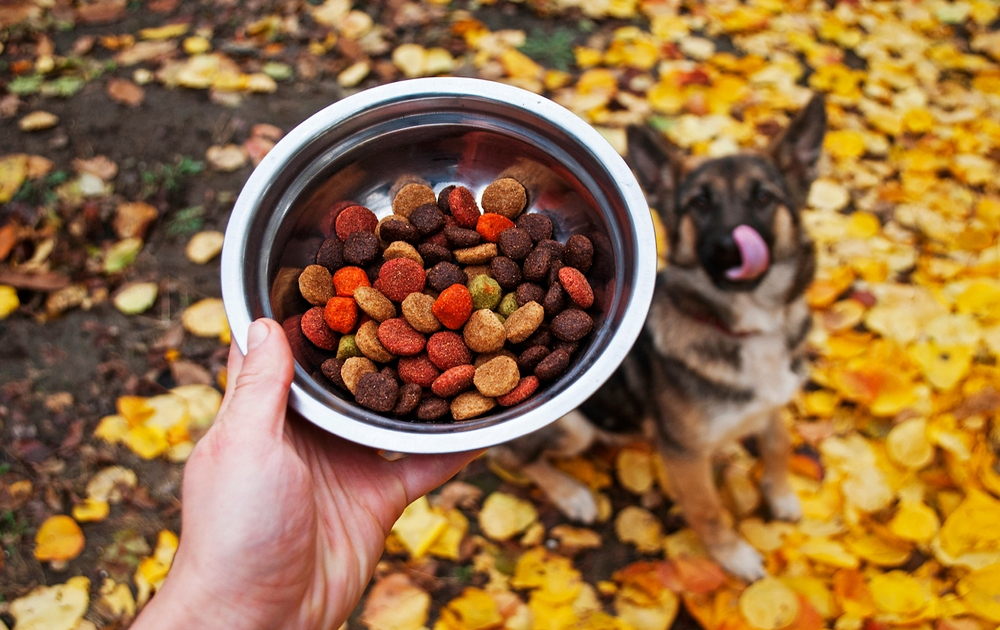When it comes to your German Shepherd’s health, providing nutritious dog food is essential. German Shepherds are a large and active breed with specific nutritional needs.
A balanced and nutrient-rich diet not only supports their overall well-being but also promotes healthy growth, strong bones, and a shiny coat.
In this guide, we will explore the importance of choosing adult dog food for German Shepherds, discuss key nutrients they require, offer tips on selecting the right food brands, and even provide homemade recipes.
Table of Contents
Understanding the Nutritional Needs of German Shepherds
German Shepherds are known for their strength, agility, and intelligence. To keep them at their best, it is crucial to understand their unique nutritional needs. These majestic dogs require a well-balanced and nutritious diet to support their active lifestyle and overall health.
Protein is a fundamental component of a German Shepherd’s diet. Being a highly active breed, they need protein to maintain strong muscles and support tissue repair. Look for dog foods with high-quality animal protein sources like chicken, beef, or fish.
In addition to protein, German Shepherds need healthy fats for energy and to promote a lustrous coat. Omega-3 fatty acids, found in fish oil or flaxseed, are particularly beneficial for their skin and coat health.
Carbohydrates provide a source of energy, but it’s important to choose complex carbohydrates like whole grains, sweet potatoes, and vegetables over simple sugars. Fiber-rich ingredients aid in digestion and help prevent gastrointestinal issues.
Vitamins and minerals are essential for a German Shepherd’s overall well-being. Antioxidants, such as vitamins A, C, and E, support a strong immune system and protect against cell damage.
Key Nutrients for German Shepherds’ Health
German Shepherds are a robust and active breed that requires specific key nutrients to support their overall health and well-being. Providing them with a balanced diet rich in these essential nutrients is crucial for their optimal development and longevity.
Protein is a vital nutrient for German Shepherds, as it helps maintain strong muscles and supports their active lifestyle. Look for high-quality animal-based protein sources like chicken, beef, and lamb in their food.
Omega-3 fatty acids play a crucial role in supporting joint health and promoting a shiny coat. Incorporate fish oil, salmon, or flaxseed into their diet to provide these beneficial fats.
Adequate amounts of vitamins and minerals are essential for German Shepherds’ overall health. Vitamin A promotes good vision, while vitamin E acts as an antioxidant and supports skin health. Calcium and phosphorus are crucial for strong bones and teeth.
Complex carbohydrates like brown rice and sweet potatoes provide a steady release of energy, fueling their active nature throughout the day.
Water is often overlooked but is vital for hydration and maintaining healthy bodily functions.
Understanding and meeting the key nutrient requirements of German Shepherds is essential for their overall health, energy levels, and longevity. Consult with your veterinarian to ensure you are providing the right balance of nutrients for your furry friend’s specific needs.
Choosing Nutritious Dog Food for German Shepherds
When selecting dog food for your German Shepherd, it’s important to prioritize their nutrition by considering key factors. Here are some essential guidelines to help you choose nutritious options tailored to your German Shepherd’s needs.
Firstly, pay attention to the ingredients list. Look for high-quality animal protein sources such as chicken, beef, or fish as the primary ingredient. Avoid dog foods that list generic terms like “meat by-products” or “animal meal.”
Equally important is avoiding common fillers and artificial additives. Steer clear of dog foods that contain excessive grains, corn, or soy, as these ingredients offer little nutritional value for German Shepherds. Also, opt for foods that are free from artificial preservatives, colors, and flavors.
Consider breed-specific formulas that cater to the unique needs of German Shepherds. These formulas often contain specific nutrients for joint health, such as glucosamine and chondroitin, which can help support their active lifestyle.
It’s also beneficial to consult with your veterinarian to determine any specific dietary requirements or sensitivities your German Shepherd may have.
By prioritizing important ingredients, avoiding fillers and artificial additives, and considering breed-specific formulas, you can make an informed decision when choosing nutritious dog food that supports the health and well-being of your German Shepherd.
5 Popular Brands of Nutritious Dog Food for German Shepherds
When it comes to providing your German Shepherd with nutritious dog food, several reputable brands have gained recognition for their quality and commitment to canine health. Here are a few popular brands worth considering:
1. Royal Canin: Known for their breed-specific formulas, Royal Canin offers German Shepherd-specific diets tailored to address their unique nutritional needs, such as digestive health and joint support.
2. Hill’s Science Diet: Hill’s Science Diet provides a wide range of dog food options, including formulas for large breed dogs like German Shepherds. They focus on using high-quality ingredients and offer various recipes to meet specific dietary requirements.
3. Orijen: Orijen is renowned for their biologically appropriate and grain-free dog foods. They emphasize using fresh, regional ingredients to provide a balanced and nutritious diet for dogs, including German Shepherds.
4. Taste of the Wild: Known for their ancestral diet approach, Taste of the Wild offers grain-free recipes inspired by the diets of wild canines. Their formulas incorporate real meat and provide a variety of flavors for your German Shepherd to enjoy.
5. Wellness CORE: Wellness CORE offers grain-free and protein-rich dog food options. Their formulas are designed to support the overall health and vitality of dogs, including German Shepherds, by focusing on high-quality animal protein sources.
It’s important to remember that every dog is unique, and what works for one may not work for another. Consider consulting with your veterinarian to determine the best brand and specific formula that meets your German Shepherd’s individual nutritional needs.

Homemade Dog Food Recipes for German Shepherds
Preparing homemade dog food for your German Shepherd can be a rewarding way to ensure they receive a nutritious and tailored diet.
1. Chicken and Sweet Potato Recipe: Boil boneless, skinless chicken breast and combine it with cooked sweet potatoes. This recipe provides lean protein and complex carbohydrates for sustained energy.
2. Beef and Vegetable Stew: Brown ground beef and add a variety of dog-friendly vegetables like carrots, peas, and green beans. This recipe offers a balance of protein, vitamins, and minerals.
3. Salmon and Quinoa Delight: You can feed cooked salmon fillets and mix them with cooked quinoa. This recipe provides omega-3 fatty acids for coat health and a good source of protein.
Feeding Guidelines and Portion Control
Establishing proper feeding guidelines and practicing portion control is essential for maintaining the health and well-being of your German Shepherd. Here are some key considerations to keep in mind:
1. Consult your veterinarian: Seek guidance from a veterinarian to determine the appropriate daily caloric intake for your German Shepherd based on their age, weight, activity level, and overall health. They can provide specific feeding recommendations tailored to your dog’s needs.
2. Follow serving size recommendations: Dog food labels typically provide recommended serving sizes based on weight. Use these guidelines as a starting point, but adjust accordingly based on your dog’s individual metabolism and energy expenditure.
3. Monitor body condition: Regularly assess your German Shepherd’s body condition by feeling their ribs and observing their overall body shape. Adjust their portion sizes accordingly to maintain a healthy weight. If they become overweight, reduce their food intake. If they are underweight, increase the portion size.
4. Split meals into multiple servings: Instead of feeding one large meal, consider splitting the daily portion into two or three smaller meals. This aids digestion and prevents overeating.
5. Avoid free-feeding: Avoid leaving food out all day for your German Shepherd to graze on. Controlled portion feeding helps with portion control and prevents excessive calorie intake.

Supplementing Nutritious Dog Food for German Shepherds
In addition to providing a balanced and nutritious diet, there are certain supplements that can enhance the health and well-being of your German Shepherd. Consider the following options:
1. Omega-3 Fatty Acid Supplements: Omega-3 fatty acids, commonly found in fish oil or flaxseed oil, offer numerous benefits for German Shepherds. They support healthy skin and coat, reduce inflammation, and promote cognitive function. Consult with your veterinarian to determine the appropriate dosage for your dog.
2. Probiotics and Digestive Health: Probiotics are beneficial bacteria that can help maintain a healthy gut flora. They aid in digestion, improve nutrient absorption, and support a strong immune system. Look for dog-specific probiotic supplements or consider incorporating probiotic-rich foods like plain yogurt into their diet.
3. Joint Supplements for Long-Term Health: German Shepherds are prone to joint issues, so adding joint supplements to their regimen can be beneficial. Glucosamine, chondroitin, and MSM are commonly used supplements that promote joint health, improve mobility, and help prevent age-related joint problems.
Common Nutritional Issues in German Shepherds
German Shepherds, like any breed, can experience specific nutritional issues that require attention and management. Here are some common nutritional concerns for German Shepherds:
1. Food Allergies and Sensitivities: German Shepherds can develop allergies or sensitivities to certain ingredients in their food, such as grains, chicken, or dairy.
Symptoms may include skin itching, gastrointestinal upset, or ear infections. Identifying and eliminating the allergen from their diet is crucial, and a veterinarian can assist in determining the best approach.
2. Weight Management and Obesity: Due to their love for food and tendency to have a hearty appetite, German Shepherds are prone to weight gain and obesity.
Maintaining a healthy weight is important to prevent strain on joints, reduce the risk of certain diseases, and promote overall well-being. A balanced diet, portion control, and regular exercise are essential for weight management.
3. Joint and Bone Health Concerns: German Shepherds are susceptible to joint and bone issues like hip dysplasia and arthritis. Providing a diet rich in joint-supporting nutrients such as glucosamine, chondroitin, and omega-3 fatty acids can help maintain healthy joints and reduce the risk of these conditions.
Additionally, managing their weight and avoiding excessive high-impact activities can lessen the strain on their joints.
Frequently Asked Questions
1.Can I feed my German Shepherd a homemade diet?
Ans: Yes, you can feed your German Shepherd a homemade diet, but it’s important to ensure it is nutritionally balanced and consult with a veterinarian or canine nutritionist to meet their specific dietary needs.
2.How often should I feed my German Shepherd?
Ans: Most adult German Shepherds do well with two meals per day, while puppies may require three to four meals. It’s important to establish a regular feeding schedule to promote healthy digestion.
3.What are the signs of a food allergy in German Shepherds?
Ans: Signs of a food allergy in German Shepherds may include itching, excessive scratching, gastrointestinal issues like vomiting or diarrhea, ear infections, or skin irritation. If you suspect an allergy, consult with a veterinarian for proper diagnosis and guidance.
4.Can German Shepherds eat raw food?
Ans: Raw food diets can be an option for German Shepherds, but it’s important to research and follow proper food safety guidelines. Consult with a veterinarian to ensure a balanced and safe raw food diet.
5.Should I give my German Shepherd supplements?
Ans: The need for supplements depends on your German Shepherd’s specific health and dietary requirements. It’s best to consult with a veterinarian to determine if supplements like omega-3 fatty acids, joint supplements, or probiotics would be beneficial for your dog’s well-being.
Conclusion
Ensuring the proper nutrition for your German Shepherd is vital for their overall health, vitality, and longevity. By understanding their unique nutritional needs, selecting nutritious dog food brands, and considering supplements when necessary, you can provide them with a well-rounded diet.
Additionally, being aware of common nutritional issues such as food allergies, weight management, and joint health concerns allows you to address and prevent potential problems.
Remember to consult with your veterinarian for personalized guidance and to tailor your German Shepherd’s diet to their specific requirements. With a nutritious diet and proper care, you can help your German Shepherd thrive and enjoy a happy, healthy life by your side.

I’m David, an expert contributor and writer, with two furry friends of my own, I know the challenges of raising and caring for dogs. From training to nutrition and health, my goal is to provide valuable insights and advice to help create strong bonds and happy, healthy lives. Find me in Twitter.




